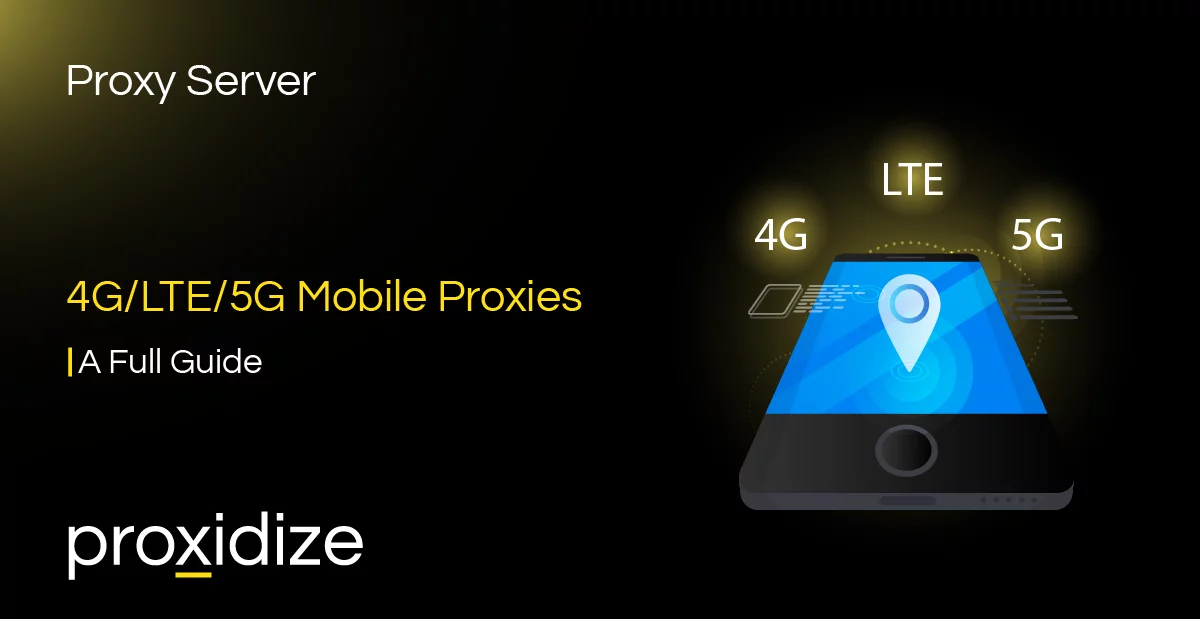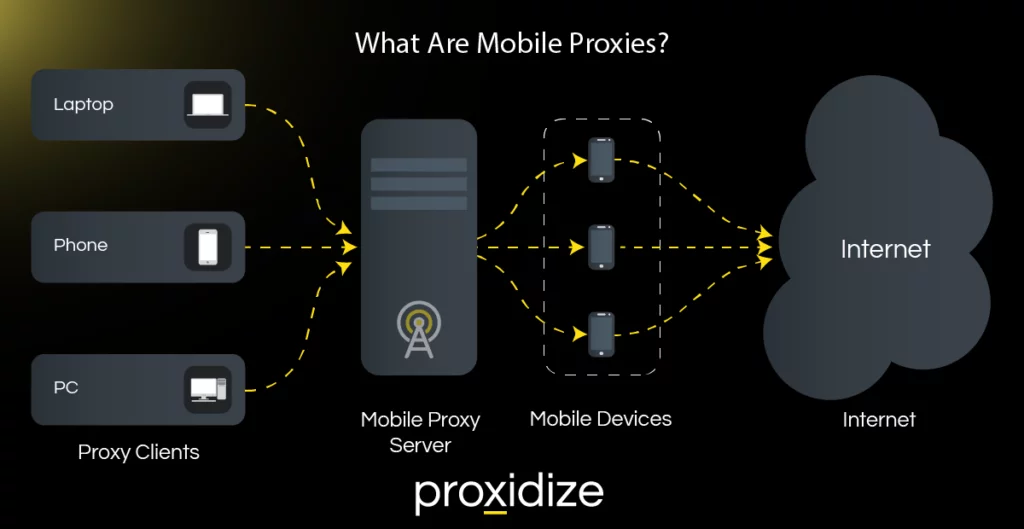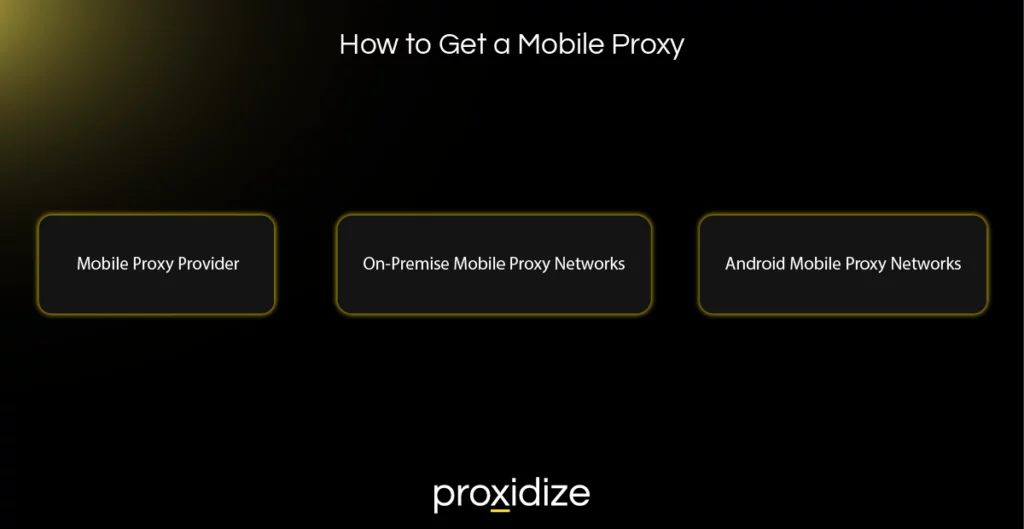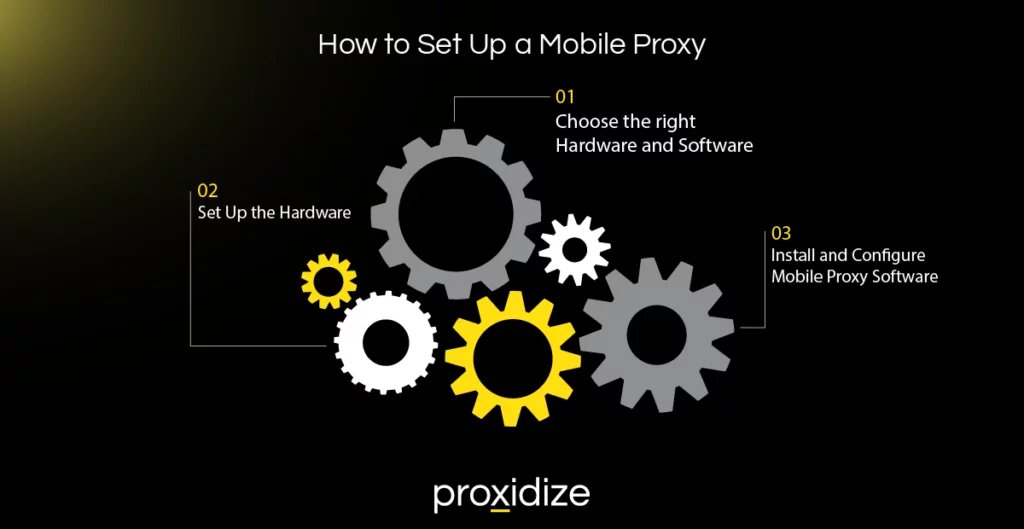
Mobile proxies, also known as 4G proxies, are becoming increasingly popular due to their ability to provide users with a high level of efficiency in web scraping and online automation tasks. Unlike residential or datacenter proxies, mobile proxies use IP addresses associated with mobile devices, such as modems, smartphones, or tablets. This allows you to browse the internet as if you were using a mobile device, making it difficult for websites or online services to detect and block your activities.
This comprehensive guide will explore what 4G/LTE/5G mobile proxies are, how they work, and the benefits they offer. Whether you are a regular internet user, a business owner, or someone who values new-age technology, understanding mobile proxies can help you make informed decisions about your online activities and security.

A proxy is an intermediary server, or a "middleman", as some people may like to call it, that sits between your device and the Internet. Rather than directly sending a network request directly to the web, a proxy server will intercept that request and send it on your behalf.
This process is beneficial in many scenarios and use cases, and with many types of proxies available in the market, it's helpful to gain perspective into the benefits of each one. So, what are mobile proxies?
A mobile proxy is one type of proxy server that establishes a secure Internet connection between your device and the web. What differentiates mobile proxy servers from other types is their utilization of mobile IP addresses and cellular network infrastructures associated with mobile carriers. In a nutshell, it enables you to access the web by routing all traffic through the server - which then relays it back to you.
As already mentioned, a mobile proxy network works by intercepting traffic from your device and routing it to the internet. But how exactly does it do that? In simple terms, once the mobile proxy intercepts your requests, it transmits them through a mobile device or a portable device (i.e., modem) containing a SIM card, replacing your IP address, in this case, with a mobile IP address from the provider's proxy pool.
This type of proxy server employs either HTTP or SOCKS protocols. The HTTP protocol, the most common protocol, is designed to handle web traffic — specifically web requests and responses. On the other hand, the SOCKS protocol is designed to handle a wider range of traffic types beyond HTTP traffic, including gaming and P2P (peer-to-peer) file sharing.
It also leverages cellular towers as essential components in its routing process to web servers by taking advantage of 3G, 4G, or 5G networks and CGNAT - ultimately enhancing your online experience and reducing the risk of IP blocking from online services.
With that in mind, a mobile proxy typically works by offering you the following features, which are meant to make your online activities more efficient.
1. Network Connection: Mobile proxies use real mobile devices with SIM cards to connect to mobile networks, including 4G/LTE or 5G networks. These mobile devices act as gateways to the internet.
2. IP Address Rotation: They can rotate or change their IP addresses regularly. This dynamic IP rotation helps prevent websites or online services from detecting and blocking your requests.
4. Anonymity: Provide a certain degree of anonymity by masking your device's legitimate IP address. This can be useful for privacy or security reasons, as websites won't be able to track your real IP address.
5. Bypassing Restrictions: They help bypass online restrictions imposed by websites or services. For example, they can be used to overcome IP bans.
6. Scalability: Mobile proxy networks can be scaled up by adding more mobile devices to the network. This allows for a larger IP address proxy pool and better load distribution.
7. Security and Encryption: Some mobile proxies offer encryption, adding a layer of security to your internet traffic. This is particularly useful when using public Wi-Fi networks or when you want to protect your data from potential eavesdropping.
8. Load Balancing: They balance traffic across multiple devices or servers, ensuring that requests are evenly distributed, which can improve performance and reliability.
Moving on from the basic understanding of how mobile proxies work, let's explore the various types of. By understanding their different categories, you can gain a view of the diverse options and capabilities in the world of mobile proxies.
Mobile proxies come in various types based on the generation of cellular networks they utilize. The main types include 3G proxies, 4G/LTE proxies, and 5G proxies. Not only do they differ in cellular generations, but they also operate on different protocols. Each of these proxies corresponds to different mobile technology and offers capabilities for various use cases:
A 3G proxy operates on third-generation mobile data networks. While it delivers slower speeds in comparison to newer generations, it offers cost-effectiveness for tasks that do not demand high-speed data transmission. This type of proxy is particularly well-suited for applications such as web browsing, data scraping, and accessing content that is optimized for mobile devices. With its ability to provide mobile-specific content, the 3G proxy is a reliable choice for various use cases where high-speed connectivity is not a primary requirement.
The 4G or LTE proxy, often mistaken as two separate network types, functions on fourth-generation mobile data networks and is also known as Long-Term Evolution (LTE). It provides significant proxy speeds compared to 3G proxies. It strikes a balance between speed and cost-effectiveness, making it a popular choice for a wide range of applications.
The enhanced speed and reliability of 4G proxies make them ideal for tasks such as social media management, web scraping, online marketing, and automation. Their ability to handle data-intensive activities efficiently positions them as versatile solutions for modern internet-based applications.
At the forefront of mobile technology, the 5G proxy leverages fifth-generation mobile data networks, representing the latest and fastest generation. While they come at a higher cost, 5G proxies offer exceptional speed and ultra-low latency, making them ideal for bandwidth-intensive use cases.
These proxies are capable of handling activities that demand lightning-fast connectivity, such as streaming high-quality videos, online gaming, and real-time data analysis. They deliver smoother streaming experiences, support high-resolution content delivery, and enable seamless real-time interactions for applications that require cutting-edge performance.
SOCKS mobile proxies are versatile solutions that can be applied across multiple generations of mobile networks, including 3G, 4G, and 5G. They operate on SOCKS protocols, most commonly the SOCKS5 protocol, which enables flexible routing and authentication options. They provide a reliable and customizable option for those seeking versatile mobile proxy solutions.
HTTP mobile proxies, similar to SOCKS proxies, are adaptable to different mobile network generations. These proxies operate on the HTTP protocol and offer a straightforward approach to routing web traffic. They are known for their simplicity and efficiency when it comes to handling online activities that don't require advanced protocol support.
Each of these mobile proxies has its own set of advantages and limitations. If speed is a crucial component you need to consider, then moving towards 4G and 5G proxies is the suitable option. On the other hand, if you're looking for a cost-effective solution for less data-intensive tasks, 3G proxies would be the ultimate choice. Therefore, the choice depends on your specific use case.
Mobile proxies have gained in popularity recently as they've become an essential tool for businesses and individuals alike, and it's quite easy to see why. When putting them side by side with other proxy types, it's evident that they bring an array of advantages that truly stand out. However, they also come with certain drawbacks.
Despite these disadvantages, mobile proxies remain a valuable choice for certain use cases where authenticity, low detection rates, and the ability to access mobile-specific content are essential. Careful consideration of your specific needs and constraints is crucial when deciding whether they are the right solution for you.
Since mobile proxies handle your internet traffic by utilizing a cellular network's infrastructure, including mobile phone IP addresses and cellular networks, they enable you to mimic the behavior of a mobile user, even when using a non-mobile device. Thanks to this feature, they're considered to be the most reliable proxies and have been significantly employed in a wide variety of business operations and individual use cases. So, when can you utilize a mobile proxy network?
Web scraping stands out as the most widespread use case of mobile proxy networks. Mobile proxies offer the most effective solution for individuals or businesses seeking to extract and analyze information from various online resources - proving to be valuable in market research, competitive analysis, and SEO monitoring. Employing mobile proxies in such scenarios prevents IP blocks from scraping activities, thanks to their top-notch quality, all due to CGNAT.
Businesses acquire mobile proxies to efficiently manage and automate their online presence, using multiple social media accounts simultaneously. They allow seamless engagement with their target audience by automating timely interactions while maintaining a responsive online persona and automating the scheduling and publishing of posts to ensure a consistent flow of content.
Mobile proxy networks play an important role in SEO monitoring, enabling businesses to track their website's performance and ensure that it is always relevant and optimized for the search engine algorithms. Mobile proxies offer a variety of capabilities, such as tracking keyword positions, determining how competitors are ranking, and more.
Advertisers use mobile proxies to monitor the accuracy and credibility of their ad campaigns. They do this by tracking ad placements, impressions, and clicks. Advertisers can detect and prevent ad fraud by analyzing traffic patterns, IP addresses, and user behavior. This involves safeguarding against misleading reporting and inflated metrics caused by bots generating fake clicks and conversions.
Price comparison and monitoring can benefit the e-commerce and ticketing industries, as they can track competitors' prices and adjust their pricing strategies according to recent trends. When monitoring the prices of different competitor platforms, businesses can ensure that their rates are competitive and attractive to customers.
Not only does it benefit businesses, but individuals can also use mobile proxies when shopping online to access different online stores and compare prices for the same product across multiple platforms. This allows you to find the best deals and save money on your purchases.
Automation is also another widely utilized use case of mobile proxy networks. When deploying APIs or automation tools within the mobile proxy, you're able to streamline tasks with limited human intervention. Thus creating an effective system of automating your online activities that are otherwise done manually, such as social media automation, content automation, and more.
Ticketing is another important use case, as many ticketing websites have implemented strict online restrictions to prevent ticket scalping and ensure fair access to tickets for everyone. However, this can make it difficult for legitimate users to purchase tickets for popular events.
With the help of mobile proxies, users can increase their chances of successfully purchasing tickets for high-demand events. They can create multiple accounts and make simultaneous ticket purchases without being detected and blocked by the ticketing website.
By using mobile proxy servers, businesses can monitor and protect their brand by performing regular checks on websites and social media platforms. They can detect any unauthorized use of their brand name, logo, or copyrighted content. This proactive approach helps in preventing brand dilution and maintaining a strong brand image.
They also enable businesses to conduct automated brand monitoring, allowing them to track mentions, reviews, and comments about their brand across various platforms. This helps in identifying any potential threats or negative feedback that could harm the brand's reputation.
A residential proxy network uses a residential IP address that is assigned to devices in a typical home network by an Internet Service Provider. These proxies are often more widely available with a larger proxy IP pool than mobile proxy networks.
Choosing between mobile proxies and residential proxies depends on your specific needs and priorities. If you require IP addresses with enhanced security and have a lower chance of being blocked, mobile proxies might be the better option. However, if your use case requires a wide pool of IP addresses, then residential proxies are likely to be more suitable.
It's worth noting that mobile proxies tend to be more expensive compared to residential proxies. This is due to the limited availability of mobile IP addresses and the higher demand for them. Residential proxies, on the other hand, are generally more affordable and easier to obtain.
Both mobile proxies and residential proxies have their own strengths and weaknesses. Therefore, it's best to consider factors such as anonymity, stability, and cost when deciding which type of proxy to choose for your specific requirements.

Creating a mobile proxy network can truly be a game-changer for those looking to enhance their online browsing experience or engage in activities that require multiple IP addresses. Here are the different ways in which you can create your own mobile proxy network:
The easiest option would be to sign up for a mobile proxy plan that best suits your requirements and budget with trusted proxy providers. This method limits the hassle of setting up and configuring your own network. However, a reliable provider tends to be less cost-effective, especially for long-term use, and is known to surprise you with hidden costs.
Additionally, depending on a provider's infrastructure can lead to service disruptions, especially if the provider experiences technical issues. You may also have minimal control and customization features regarding automatic IP rotation capabilities, sticky sessions, and concurrent connections. Lastly, entrusting a third party with traffic routing raises privacy concerns, as providers might retain user data or engage in monitoring activities.
Another option would be to build your very own on-premise mobile proxy. An on-premise mobile proxy network is a type of mobile proxy network that is set up and managed directly on your own premises. This means that you have full ownership over your extensive network features, allowing for greater security and customization options. Creating your in-house solution is the way to go for businesses that need a more reliable network with advanced control, which means you can customize your proxy settings and rotate IP addresses as needed.
To do this, you can acquire the necessary hardware and software from a trusted vendor so you can host your own network - which is what we provide our clients here at Proxidize. This ensures that you're fully in control over your proxies without relying on third-party services, where you can customize the mobile proxy network as per your specific requirements. It also guarantees faster speeds and cost-effective long-term solutions.
The last option would be to create a mobile proxy network using mobile devices. On the positive side, this approach offers cost efficiency by repurposing existing mobile devices as proxy nodes, eliminating the need for additional hardware investment.
However, it comes with technical complexities, requiring expertise in configuration and management that might be challenging for non-technical users. Additionally, the nature of running proxies on mobile phones can impact the device's performance and battery life. Stability and reliability could also be compromised as mobile phones may not offer the same level of uptime as dedicated servers.

Setting up a mobile proxy can be relatively simple, however, it is essential to choose a reputable and reliable provider to ensure a secure and seamless browsing experience. With a mobile proxy in place, you can enjoy the convenience of accessing the internet securely, no matter where you are.
Yes, mobile proxies are legal in most countries. However, there are certain activities that can be considered illegal when using a mobile proxy server, just as with any other internet-related tool.
If a mobile proxy server is used for illegal activities such as hacking, fraud, or any form of malicious activity, then it becomes illegal. Engaging in activities that violate copyright laws or participate in any form of illegal online activity using a mobile proxy server can lead to legal consequences.
It is essential to abide by the laws and regulations of your country when using a mobile proxy server. Familiarize yourself with the legal implications and ensure that you use it responsibly and within the boundaries of the law.
The world of mobile 3G/4G/5G proxies is a dynamic and transformative realm. These proxies have evolved to meet the growing demand for high-speed, reliable, and secure internet connectivity. As we've explored in this article, they function as essential intermediaries, availing the strength of cellular networks to provide seamless online experiences.
From their diverse applications in web scraping, social media management, and security testing to their ability to mimic realistic user behavior, mobile proxies have become indispensable tools for individuals and businesses alike. Understanding their inner workings and the distinct advantages they offer can empower us to navigate the virtual age with confidence and efficiency.
All Proxidize hardware is assembled and shipped with from the United States
and the Netherlands
All Proxidize hardware is assembled and shipped with from the United States
and the Netherlands